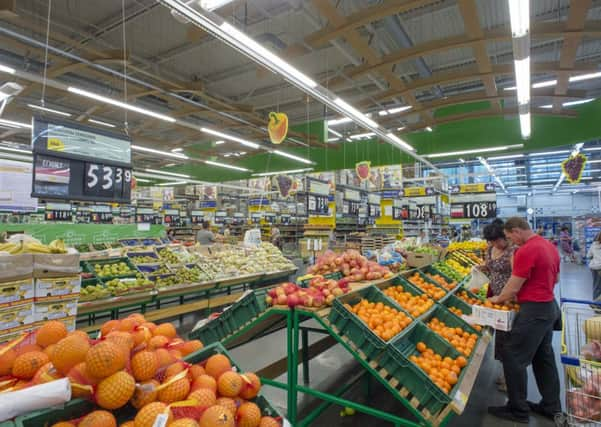Putin’s Ukraine action could slash UK food bills


The price of fruit and veg in UK supermarkets could plummet as a surplus floods the domestic market after the Russian president Vladimir Putin banned food imports from the European Union and United States in retaliation at sanctions they imposed last week over the Ukraine crisis.
Experts have estimated the sanctions could threaten £50 million worth of Scottish exports, including dairy products, eggs, fish and seafood, fruit, vegetables and cereals.
Advertisement
Hide AdAdvertisement
Hide AdDavid Lonsdale, director of the Scottish Retail Consortium, said Russian sanctions, combined with already low price inflation, could lead to a drop in shopping bills.
Prices in British shops fell last month at the fastest rate since records began seven-and-a-half years ago, according to the British Retail Consortium.
He said: “It is a reasonable proposition that the producers and distributors of fresh fruit and veg currently exported to Russia will look to other markets – either existing ones in Britain and the rest of Europe, or further afield. So we could see a drop in prices here and in other existing markets.
“It could potentially be very good news for shoppers already benefiting from record low prices in shops, and at a time when household incomes remain under pressure.”
Economist Ruud Huirne, head of food and agriculture at Dutch financial institution Rabobank, said fresh produce which can spoil would have to be sold off cheaply by large retailers across Europe.
He said: “The food and agri market in western Europe is more or less saturated.
“If 3 per cent of total exports falls away there will be huge drops in price.
“You can freeze meat and store milk powder, but you have to use vegetables and fruit immediately.”
Advertisement
Hide AdAdvertisement
Hide AdWestern countries, including the UK, have imposed sanctions on Russia following the escalation of the Ukraine crisis after the downing of Malaysia Airlines Flight MH17 over Donetsk last month.
The West believes pro-Russian separatists backed by Moscow were responsible for the deaths of all 298 onboard.
Across Europe, certain products, including tomatoes, cucumbers and peaches, have already been sold to retailers at a low price this summer because of a glut caused by good weather during the growing season.
Experts have also warned that producers of foodstuffs which have not yet been officially banned by Russia, such as processors of potatoes or other vegetables, could also find their prices dropping as domestic firms opt not to take the financial risk of shipping products to Russia only to have them turned away at the border.
But Leigh Sparks, professor of retail studies at Stirling University, warned supermarkets may not pass any potential price cuts on to the consumer. He said: “There will be an extra surplus, but whether we will see a reduction in price for consumers is debatable.
“It is a fact that producers could store some fruit and veg, like apples, but that others will have to be got on to the market as quickly as possible. However, at the moment, we are already seeing a surplus because of the time of year and prices are already low.
“You only have to go to a supermarket to see the numbers of strawberries and raspberries that are there, so whether they will cut prices further will remain to be seen.
“If the products which would have been destined for Russia come on to the market just as the season is ending, then it could prolong the low summer prices.”